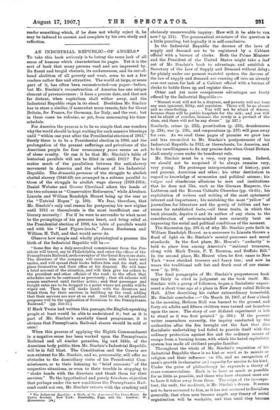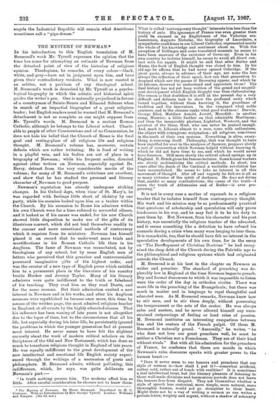AN INDUSTRIAL REPUBLIC—OF ANGELS.* To take this book seriously is
to betray the same lack of all sense of humour which characterises its pages. Yet it is the sort of book that many persons read and are impressed by. Its fluent and turgid rhetoric, its cocksureness, and its out-of- hand abolition of all poverty and want, seem to not a few readers rather fine and attractive. The world at large, or some part of it, has often been reconstructed—on paper—before, but Mr. Sinclair's reconstruction of America has one unique element of persuasiveness : it fixes a precise date, and that not far distant, when capitalism shall wither away, and the Industrial Republic reign in its stead. Doubtless Mr. Sinclair has in store a similar, if somewhat more remote, fate for Great Britain, for France, for Germany, for Italy, and the rest; but in these cases he refrains, as yet, from announcing his time- schedule.
For America the process is to be so simple that one wonders why the world should be kept waiting for such massive blessings until " within one year after the Presidential election of 1912." Surely there is to be a Presidential election in 1908, and the prolongation of the present sufferings and privations of the American people for four unnecessary years seems an act
of sheer cruelty. Or can it be that Mr. Sinclair's table of historical parallels will not be filled in until 1912 ? For he makes much of the parallelism between the anti-slavery movement in America and the advance of his Industrial Republic. The dramatis personae of the struggle to abolish ehattel slavery (1846-63) are arranged in a column parallel to those of the struggle to abolish wage slavery (1893-1914). Daniel Webster and Grover Cleveland adorn the heads of the two columns as " Conservative Reformers," while Abraham Lincoln and William Randolph Hearst bring up the rear as the "Untried Hopes" (p. 199). We fear, therefore, that Mr. Sinclair's only real reason for postponing his new regime until 1912 or thereabouts is the most insufficient one of literary necessity ! For if he were to surrender to what must be the promptings of his generous heart, and bring relief at the Presidential election of 1908, his table of parallels would end with hie "Last Figure-heads," James Buchanan and William H. Taft, and that would never do.
Observe how simple and wholly physiological a process the birth of the Industrial Republic will be :-
"Some fine day a duly-accredited commissioner from the Pre- sident will travel, say to Philadelphia, and enter the offices of the Pennsylvania Railroad, arch-corrupter of the Great Keystone state. The directors of tho company will receive him with bows and smiles, and will spread their books before him and his staff, and place themselves and their office at his disposal. He will hear a brief account of the situation, and will then give his orders to the president and other officials of the road : to the effect that schedules are to be continued as previously ; that all salaries will remain unaltered until further notice ; and that passenger and freight rates are to be dropped to a point where net profits will be wiped out. Then he will shake hands with the directors and thank them for their services in building up the road, adding that their services are now at an end. And that, for all practical purposes will be the application of Socialism to the Pennsylvania Railroad." (pp. 210-11.)
If Mark Twain had written this passage, the English-speaking people at least would be able to understand it; but as it is part of ,Mr. Sinclair's carefully timed programme, it is obvious that Pennsylvania Railroad shares should be sold at once !
When this process of applying the Eighth Commandment in a negative sense has been worked upon the Pennsylvania Railroad and all similar parasites, big and little, of the American body politic, then Mr. Sinclair's Industrial Republic will be in full blast. The Constitution and the Courts are non-existent for Mr. Sinclair, and so, presumably, will offer no
obstacles to the domiciliary visits of his Presidential Com- missioners, or to their listening to "brief accounts" of the respective situations, or even to their trouble in stopping to " shake hands with the directors and thank them for their services." To the hypothetical and purely frivolous objection that perhaps under the new conditions the Pennsylvania Rail- road could not run, Mr. Sinclair retorts with the crushing and * The Industrial Republic: a Study of the America of Ten Years Hence. By Upton Sinclair. New York : Doubleday, Page, and Co. London ; W. lletuominus. [6s.j
obviously unanswerable inquiry : How will it be able to run now ? (p. 211). The grammatical structure of the question is a little puzzling, but logically it is self-conclusive.
In the Industrial Republic the decrees of the laws of supply and demand are to be registered by a Cabinet official with a bureau of clerks. Both the Prime Minister and the President of the United States might take a leaf out of Mr. Sinclair's book to advantage, and establish a Secretary of the Law of Supply and Demand without delay; for plainly under our present wasteful system the decrees of the law of supply and demand are running off into an already over-wet ocean for lack of a Cabinet official with a bureau of clerks to bottle them up and register them.
Other and yet more conspicuous advantages are freely offered by the Industrial Republic :--
" Manual work will not be a disgrace, and poverty will not keep any man ignorant, filthy, and repulsive. There will be no classes and no class-feeling You will not be afraid of disease, because there will be public hospitals for the sick; and you will not be afraid of rowdies, because the rowdy is a product of the slum, and there will not be any slums." (p. 227.)
Similarly, crime (p. 232), prostitution (p. 233), drunkenness (p. 234), war (p. 236), and corporations (p. 237) will pass away for ever. As we read these pages of promise we grow less and less reconciled to Mr. Sinclair's postponement of his Industrial Republic to 1912, or thereabouts, for America, and to his unwillingness to fix any precise date when Great Britain shall surely come under its beneficent rule.
Mr. Sinclair must be a very, very young man. Indeed, we should not be surprised if he always remains very, very young. His grotesque interpretations of history, past and present, American and other; his utter destitution in regard to knowledge of economics and political science; his vulgar and slanderous allusions to men and institutions that he does not like, such as the German Emperor, the Lutheran and the Roman Catholic Churches (pp. 64-65); his exploitation of writers and writing of the most ephemeral interest and importance ; his mistaking the most "yellow" of journalism for literature and the gossip of lobbies and bar- rooms for established facts,—all these traits, in which the book abounds, deprive it and its author of any claim to the consideration of serious-minded men earnestly bent on improving the social and political conditions of the moment. The discussion (pp. 201-4) of why Mr. Sinclair puts faith in William Randolph Hearst as a successor to Lincoln throws a flood of light on Mr. Sinclair's mental processes and moral standards. In the first place, Mr. Hearst's " audacity " is held to place him among America's "national treasures, along with Mark Twain, P. T. Barnum, and Buffalo Bill." In the second place, Mr. Hearst when he first came to New York " wore checked trousers and fancy ties ; and now he wears the traditional soft bat and frock coat of our states- men " (p. 204).
The final paragraphs of Mr. Sinclair's preposterous book
may fairly be cited in judgment on the book itself. Mr. Sinclair, with a group of followers, began a Socialistic experi- ment a short time ago at a place in New Jersey called Helicon Hall. After describing his rather extraordinary household, Mr. Sinclair concludes :—" On March 16, 1907, at four o'clock in the morning, Helicon Hall was burned to the ground, and forty-six adults and fifteen children were turned out homeless upon the snow. The story of our ill-fated experiment is left to stand as it was first printed." (p. 284.) If the present writer remembers correctly, the inquiry conducted by the authorities after the fire brought out the fact that this Socialistic undertaking had failed to provide itself with the
ordinary protection against fire and the ordinary means of escape from a burning house, with which the hated capitalistic system has made all civilised peoples familiar. Throughout the whole of Mr. Sinclair's exposition of his Industrial Republic there is no hint or word as to morals or religion and their influence on life, and no recognition of man's growth in character and capacity for service to his kind. Under the guise of philanthropy he expounds a theory of crass commercialism. Each is to have as much as possible for as little as possible, and those who have obtained most are incompe- tent, have it taken away from them. The reign of the ncompe- tent, the unfit, the mediocre, is Mr. Sinclair's dream. It seems not to have occurred to him, as it has not occurred to Socialists generally, that when men become angels any theory of social organisation will be workable, and that until they become angels the Industrial Republic will remain what Americans sometimes call " pipe-dream."



































 Previous page
Previous page